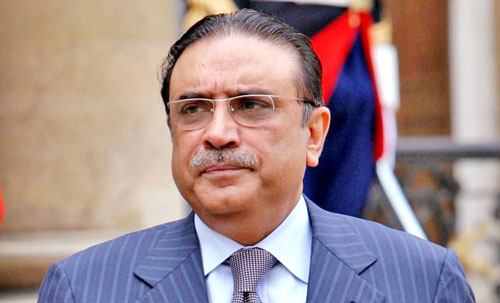——— “Zardari is the joint candidate for the slot of President,” Shehbaz affirms in presence of all allies
——— Says ruling allies respects mandate of PTI-backed candidates in KP
——— Sees economic prosperity in near future
——— Zardari asserts like Einstein, Premier will also not be afraid of challenges
From Zeeshan Mirza
KARACHI: All allied parties — including Muttahida Qaumi Movement-Pakistan (MQM-P) — part of the coalition government in the Centre have agreed to support the Pakistan Peoples Party’s (PPP) nominee Asif Ali Zardari in the presidential election scheduled for March 9 (Saturday).
The development came during a dinner hosted by Prime Minister Shehbaz Sharif at his official resi-dence in Islamabad for the representatives belonging to the allied parties.
The Istehkam-e-Pakistan (IPP), and other smaller parties are also part of the coalition government led by the Pakistan Muslim League-Nawaz (PML-N).
“Asif Zardari is the joint candidate for the slot of president. All allies will jointly make efforts to find out solutions to the crisis [facing the country],” said PM Shehbaz while addressing the participants during the gathering.
The premier said Zardari will be elected as the president of the country in the next two to three days.
PM Shehbaz said PML-N along with allied parties has secured a two-thirds majority in the National As-sembly, noting that he respected the mandate of Pakistan Tehreek-e-Insaf (PTI)-backed independent candidates in Khyber Pakhtunkhwa. “Khyber Pakhtunkhwa is our own province. We will try to move forward together,” the PM said adding that the allied parties have a majority in Senate, National and provincial assemblies. “But having a majority does not mean that we should not seek votes [from other parties].”
“The heart testifies that when Asif Zardari becomes the president, there will be coordination to achieve the objectives,” PM Shehbaz remarked while addressing the allies. Speaking on the occasion, Zardari said like renowned physicist Albert Einstein, PM Shehbaz will also not be afraid of challenges.
“There are difficulties indeed but nothing is impossible, we will develop the country together,” the PPP co-chairperson pledged.
Concurring with PM Shehbaz on crucial challenges facing the country, Zardari said he would lend his support whenever it is required.
For his part, PPP Chairman Bilawal Bhutto likened Zardari to the Queen of England, suggesting that the upcoming president will be a ceremonial head of the state.
All allies have previously announced supporting Zardari in the presidential election except the MQM-Pakistan. The MQM-P was reportedly reluctant to support the PPP’s candidate in the Senate chairman and pres-idential elections over its differences with the latter over the power-sharing formula.
In the recent audio leaks, top MQM-P leader Mustafa Kamal claimed that the PML-N informed his par-ty’s delegation that the PPP was trying to sideline his party.
Earlier today, PPP leader Faisal Karim Kundi said that the MQM-P would support Zardari in the presi-dential election.
Speaking at a press conference Kundi expressed confidence that Zardari would secure over 400 votes in the March 9 election.
A few days ago, Geo News learnt via sources that the Bilawal-led party has accomplished the mission to gather the support of 345 electoral votes for its nominee Zardari ahead of the presidential election.
In the March 9 electoral event, Zardari will face Mahmood Khan Achakzai, chairman of the Pash-tunkhwa Milli Awami Party (PkMAP), who has been nominated as presidential candidate by the Paki-stan Tehreek-e-Insaf (PTI)-backed Sunni Ittehad Council (SIC).
The president is elected via secret ballot in a special session of the parliament, Senate, and all four provincial assemblies under Article 41(3) of the Constitution, after the formation of the Electoral Col-lege.
As far as the number of lawmakers concerned, who would attend the electoral event, the Electoral College of 692 votes includes 96 senators, 336 Members of the National Assembly (MNAs), and 260 votes from the four provincial assemblies.
According to the Second Schedule, the candidate obtaining the largest number of votes would be de-clared winner by the chief election commissioner (CEC) while the federal government will declare the results of the presidential election via a public notification.




